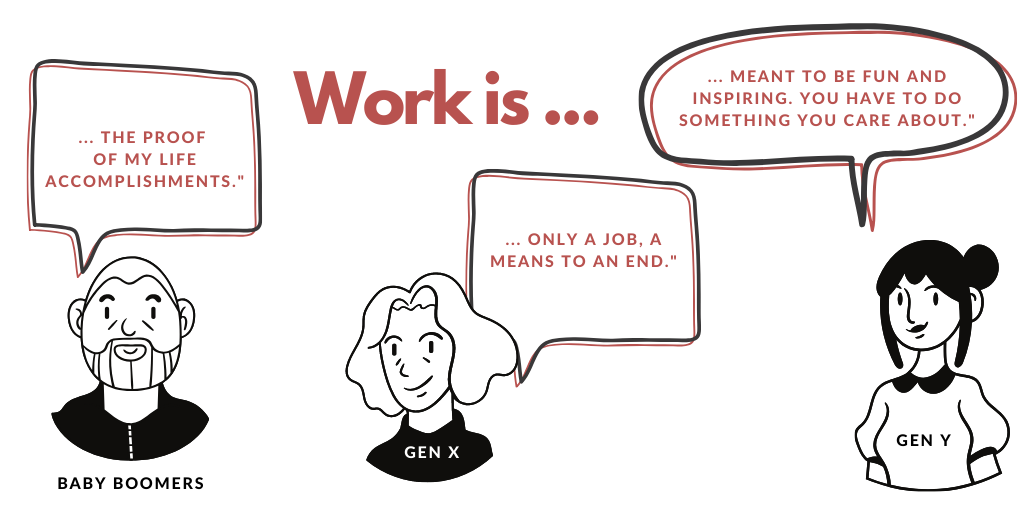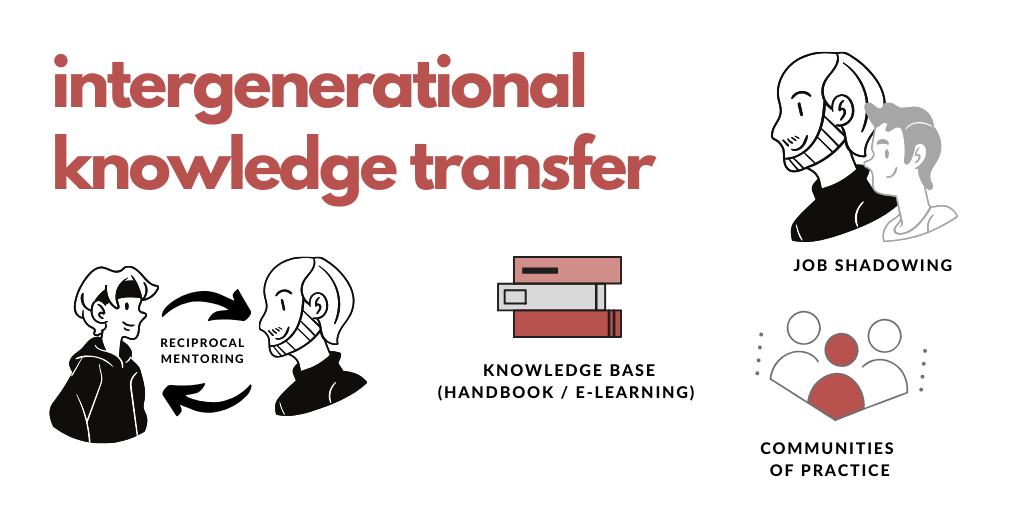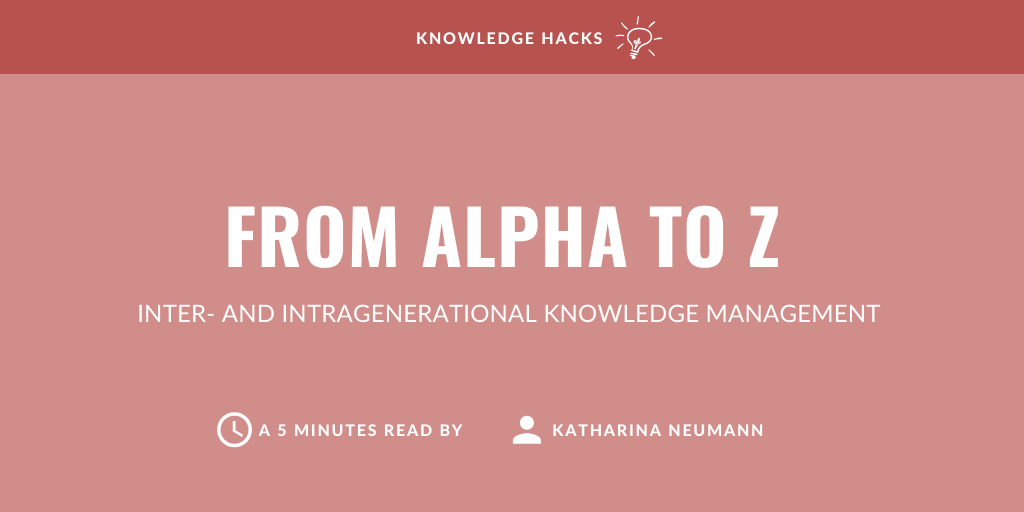As mentioned in my previous article on “How much knowledge is too much?” social networks are catalysts for generating and sharing knowledge. While generation Y basically invented social media, generation Z now floods these platforms with user generated content. If you were born before 1995 you probably already feel old when downloading TikTok and looking at teenagers performing the craziest dance challenges. But age is just a number and if you know the “bored in the house” song (Attention: catchy tune!) – I know quarantine brought you there.
The “Who is Who” of Generations
While brainstorming a bit on potential topics I can cover within this blog series on knowledge management I came across the classification of the different generations: Veterans, Baby Boomers, Gen-X, Gen-Y, Gen-Z and Gen-Alpha. Although I have always considered myself a Gen-Y, various classifications show that being born in 1996 already means being part of generation Z. However, generations cannot be strictly separated by year of birth and the classification is simply used to provide a basis for distinction.
But what is typical for a Gen-X person compared to a Gen-Y or Gen-Z? The following video will help you to get an overview of the different types:
https://www.youtube.com/watch?v=YwDyRQIMEXg&feature=youtu.be
Coming back to my birth year “story”:
- Does your year of birth match the generational group you thought you belonged to?
- Based on the characteristics mentioned in the video, do you consider yourself a Gen-X, Gen-Y or Gen-Z person?
Looking forward to hear your opinion in the comments section below.
Generation-friendly knowledge cultures
Generations Y and Z appear to be less skeptical than previous generations and trust is no longer an issue. They are more concerned with finding meaning, being heard and having an impact. Values like empathy, sharing and co-creation are on their agenda.

According to a survey of 5’000 knowledge workers belonging to Baby Boomers, Gen-Xers and Gen-Yers, there are major differences in the workplace behavior between the generations (Peterson, 2015). Gen-Yers are striving for a purpose-driven life and work needs to be both fun and inspiring. If this is the case, there are no boundaries for sharing knowledge. It may therefore also be not surprising that Gen-Yers are into gamification i.e. game-like approaches to spice up (work) tasks and earn rewards and level up. Could gamification be the new tool to make knowledge management more exciting for younger generations? Indeed, building a learning environment which suits the new generations communication preferences and providing the right tools and mechanisms for knowledge transfer is the right step to foster a culture of co-creation and innovation. But not only intragenerational i.e. within the same generation knowledge transfer is of high importance. Let us have a look at intergenerational (i.e. between generations) knowledge transfer.

If you remember the example of Johann (65 years) who is close to retirement from my blogpost “About lunch with CEOs and other knowledge management technqiues” then you probably know about the importance of knowledge sharing when employees leave the company. But why leave all knowledge transfer activities to the end of someone’s career? One great example of intergenerational management is reciprocal mentoring. Often knowledge of employees from different generations is complementary – so why not teach each other? With a mentor-mentee relationship program both the more senior and the less senior employee can become student and teacher at the same time. Similar to mentoring, job shadowing allows a less senior employee to observe an important knowledge worker during his or her daily tasks and experience the ropes of a job hands-on. Of course other techniques like communities of practice, the good old “handbook” or more modern formats like e-learning tutorials or video logs also support this process.
No matter what generation you or colleagues belong to, generation management is a factor employers need to consider in order to keep their workforce motivated. And this certainly is not just a topic for the HR department when searching for skilled knowledge workers.
Is your company currently considering generational differences with their employees? I would love to hear your insights in the comments section below!
Bibiliography
Absolventa Redaktion (2020). XYZ – Die Generationen im Überblick. Retrieved 17 April 2020, from https://www.absolventa.de/karriereguide/berufseinsteiger-wissen/xyz-generationen-arbeitsmarkt-ueberblick
Bologna, C. (2019). What’s The Deal With Generation Alpha?. Retrieved 17 April 2020, from https://www.huffpost.com/entry/generation-alpha-after-gen-z_l_5d420ef4e4b0aca341181574
Jenkins, R. (2017). How to Knowledge Transfer Effectively Across Generations. Retrieved 17 April 2020, from https://www.inc.com/ryan-jenkins/how-to-knowledge-transfer-effectively-across-gener.html
Kasasa Redaktion (2019). Boomers, Gen X, Gen Y, and Gen Z Explained. Retrieved 17 April 2020, from https://www.kasasa.com/articles/generations/gen-x-gen-y-gen-z
Marzullo, D. (2019). Gen Z, Millennials, Gen X, Baby Boomer: The 4 Leading Generations in the Workplace | Workest. Retrieved 17 April 2020, from https://www.zenefits.com/workest/gen-z-millennials-gen-x-baby-boomer-the-4-leading-generations-in-the-workplace/
Peterson, J. (2015). Leadership for the next generation knowledge worker. Retrieved 17 April 2020, from https://implementconsultinggroup.com/leadership-for-the-next-generation-knowledge-worker/





Hello Katharina,
I think it’s definitely important to consider people’s generation when you want to manage knowledge. Every generation learns differently, has different things they need to learn, etc. The thing that always bothered me with generations though is that they seem too large for me. I think I’m supposed to be at the end of generation Y, being born in 1997, but I definitely don’t feel from the same generation as people born in the 80s… So yeah I think 5-10 years should be the range of a generation, not more, in order to have precise insights on every generation.
See you next week,
Hi Juliette, thanks for sharing your insights. I also think that the year range is rather broad and we clearly have a different upbringing than people born 10 years earlier. Hope to welcome you back on the blog, soon! 🙂
Hi Katharina
Thanks again for this intresting Blog. Well do i feel like somebody from the generstion Y? Hmm yed, but i would not say that i like gameification 😅 i think since we just live once we should make most of everyday and get up early to have as much as possible from the day.
Best sandro
Hi Sandro, thanks for you positive feedback. Did you try gamification yet? Maybe it is not suitable in all contexts but as I have heard, in the sports industry, it can be quite fun. Also with learning, gamification can be interesting. Stay tuned for more! 😉
Thanks for another interesting post, Katharina! It made me laugh at the beginning because I recently found myself downloading TikTok and the soung you’re mentioning has been in my head for DAYS. Anyway, I really liked your video and the comparison about the different generations was really interesting! I definitely agree with some of the traits of the generation I belong to.
Thanks for your positive feedback, Veronica! 🙂 I think that app all got us scrolling through it too many times. What also confused me is when now listening to a song in full length and realising that you only know a small part from TikTok.
I also believe that different generations need different approaches to knowledge sharing and learning, but the examples you mentioned can definitely work in practice. Just think about our parents who teach us so much about life – this is also a part of intergenerational learning, isn’t it?
Hi Jenny, thanks for mentioning this example. Indeed! If I think about my parents they are always the ones I can ask for advice and it’s definitely a case of intergenerational knowledge management – don’t forget about the grand parents or other more senior role models in your life! 🙂
Hey Katharina, great post and the video is a funny way to define the generations. I belong to Generation Y and I can more or less identify with it. In my view, the company I work for is well equipped to deal with generation management. We have a very mixed workforce of all ages and mentoring programs are also offered. Very interesting topic and a great post!
Hi Anja thanks for your positive feedback as well as sharing insights from your work! It’s great to hear that companies are more considering such topics! Looking forward to welcome you back on the blog soon! 🙂
Hi Katharina 🙂 I was always so confused about Gen-X, Gen-Y, Gen-Z, and Gen-Alpha, but your video explains it really well, thanks for sharing! I’m generation Y and my sister is generation Z and I notice so many differences, especially in terms of average daily screen time and attention span.. incredible what can happen in just a couple of years! 🙂
Thanks for your positive feedback, Margherita! 🙂 I can imagine that especially with younger siblings one can notice so many changes!
Hey Katharina, a very profound article about the different generations. I personally think that there is still a huge gap of acceptance between them. I often hear older people considering our Generation Y as being lazy and that we don’t really know what hard work is. Maybe its because we have advanced technology to aid us and they still had to invest more time and energy to look up things manually. 😀
Therefor I guess companies should definitely invest more time in knowledge transfer between the generations to close that gap. I really like the job shadowing approach you mentioned.
Hi Stella, thanks for your positive feedback! I personally have never been confronted with these kinds of prejudices, but it was very interesting to hear it from your part – thanks for sharing these insights! 🙂